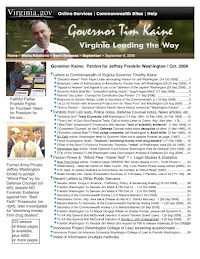Ask Governor Kaine to do as Governor Wilder did for Snyder, wrongly jailed...
DNA TESTING FREES MAN
JAILED IN RAPE
Citing a new analysis of genetic evidence, Virginia's Governor today pardoned a man who had served six and one half years on a rape conviction.
Seven hours later, Walter T. Snyder Jr., 27, walked out of the prison here into the arms of a son, Terrell, who was 1 when his father was arrested. "I'm not bitter," Mr. Snyder said, blaming what he said were overzealous detectives. "Man is so unjust, man to man."
Gov. L. Douglas Wilder said Mr. Snyder was exonerated by a test of DNA from the semen left on the victim. "In the absence of that DNA, the evidence would have been pretty damning," Mr. Wilder said in Richmond. "If it can be used to convict, it must also be used to protect the innocent."
Mr. Snyder's lawyer, Peter J. Neufeld of Manhattan, said he would seek compensation in the courts and Legislature for the "lost years of his youth." Prosecutor Sought Release
The case was unusual because the prosecutor petitioned for Mr. Snyder's release. "Had that evidence been presented at trial, he would have been acquitted," said John E. Kloch, the Commonwealth's Attorney of Alexandria.
"There's only one person who knows whether he committed this crime and that's Walter Snyder," Mr. Kloch said. "But with this evidence there's reasonable doubt in my mind."
Although the DNA test results were complete in December, Mr. Kloch defended the delay in releasing Mr. Snyder. "Virginia is a very cautious state," he said. "Sometimes a citizen can suffer because of that."
The victim of the crime, who now works as an accountant for a home-building company in Northern Virginia, said in an interview that she remained convinced that Mr. Snyder was her assailant. "I can't believe that seven years pass, then pull out a Baggie of evidence and say, 'He's not the one,' " she said. "I have been living in forgiveness. Now everything I had settled in my life is in question." Reaction From Jurors
Three of the 12 jurors who convicted Mr. Snyder said the new evidence warranted his release. "This leads you to wonder how many other errors have been made in other cases," said Walter T. Corson 2d, an environmental policy analyst who was on the jury.
Mr. Snyder had lived with his parents in Alexandria, just outside Washington. He was convicted in 1986 of raping a neighbor who reported that a man with a "puppy dog face" came through her open window and assaulted her until she faked having a heart attack.
Mr. Snyder's mother, Edith L. Snyder, a postal worker who was rearing Terrell, spent $90,000 in most of her spare time trying to free her son. She began researching genetic fingerprinting after Mr. Snyder learned about the process while reading a magazine article in prison. In 1990, a laboratory examining evidence from the Alexandria rape found too little DNA to evaluate. In December, a new technique determined Mr. Snyder was not the attacker.
In issuing the pardon, Mr. Wilder criticized a state law that prevents convicts from introducing new evidence of innocence more than 21 days after their initial appeals are exhausted. "This matter should never have been on the Governor's desk," Mr. Wilder said.
The unconditional pardon means Snyder may file a petition with the state to expunge his record of the conviction, Mr. Kloch said.
Genetic fingerprinting, which has been used primarily by prosecutors since being introduced in United States courts in 1986, has become a tool for the innocent. Several authorities in the field said Mr. Snyder was the latest of about 12 convicts who had used the technique to clear their names since 1990.
"Within months, we will see a tremendous demand for testing," said Dr. William C. Thompson, a criminology professor at the University of California at Irvine. "Word is getting around that this is possible. You wouldn't need a very high rate of false convictions to have an awful lot of people in jail who are not guilty."
http://query.nytimes.com/gst/fullpage.html?res=9F0CEEDA1331F936A15757C0A965958260








